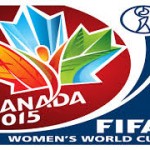
 With the stunning World Cup win of the US Women’s Soccer team yesterday, it again put FIFA in the spotlight with the pittance pay for the women compared to the Men’s soccer team who were defeated in the first round.
With the stunning World Cup win of the US Women’s Soccer team yesterday, it again put FIFA in the spotlight with the pittance pay for the women compared to the Men’s soccer team who were defeated in the first round.
Resigned Fifa president Sepp Blatter‘s public conduct has long been unapologetically sexist. In 2004, he suggested that female players should wear “tighter shorts” to make the game more appealing to male viewers. And Blatter, the self-styled “godfather” of women’s soccer, failed to even recognize Alex Morgan at the Fifa World Player of the Year event in 2012, where she was honored as one of the world’s top three players.
But these are not just isolated actions and musings of an out-of-touch leader infamous for his gaffes. Women players are paid a pittance compared to men. US club teams pay women between $6,000 and $30,000 annually, with most players on the lower end of the scale. Men playing on US club teams can earn up to $7.1 million, and the average salary is $207,831. The highest-paid male player in the world, Christiano Ronaldo, earns a $19-million base salary, and that’s before endorsements, bonuses and prize money. In contrast, the three top-earning women in the world earned $400,000, $190,000 and $70,000, respectively. Abby Wambach, the all-time highest goal scorer of any player, male or female, was only the second highest paid woman soccer player.
Fifa also deliberately excludes women from senior positions, including important oversight bodies. Of the 27 members of Fifa’s executive committee, only three are women – and none of those women are vice presidents or higher. Rather, they are “members” or “members for special tasks.” Additionally, two senior Fifa executives, including the head of the ethics committee investigating corruption in the 2018 and 2022 World Cup bidding process, asked former Independent Governance Committee member Alexandra Wrage to stop recommending female candidates for governance positions. Wrage resigned in April 2013, citing “blatant sexism” throughout the organization – and research abounds that shows a correlation between decreased corruption and women in senior leadership positions.
Last year, 84 woman soccer players from 13 countries filed a gender discrimination complaint with the Ontario Human Rights Tribunal against Fifa and the Canadian Soccer Association (CSA) after Fifa announced that this year’s World Cup would be played on artificial turf instead of natural grass. Turf greatly increases risk of player injury because of increased friction and decreased shock absorption, including career-ending injuries like ACL tears, concussions and knee injuries, as well as severe turf-specific injuries like turf toe and burns (including anti-bacteria-resistant infections). The players also argued that artificial turf degrades the “dignity, state of mind and self–respect” of athletes. After several soccer federations, to which Fifa gives hundreds of thousands of dollars annually, threatened to bar the women involved in the lawsuit from playing on their national teams, the players dropped their lawsuit.
No major men’s tournament has ever been played on artificial turf. In fact, natural grass is often installed over existing artificial turf for men’s tournaments. Shockingly, Fifa and the CSA refused to use natural grass this weekend, even after the lawncare company Scotts offered free installation at all Women’s World Cup venues. Instead of heeding to player demands for grass fields, Fifa instead installed new turf fields for the upcoming games.
The Women’s World Cup could be the first post-Blatter event that shows a new commitment from Fifa to ending discriminatory treatment of women in soccer. For starters, Fifa should: put a woman in charge of the organization and in senior management positions; change its bylaws to ensure that both men’s and women’s matches are played on grass; insist that national soccer federations equalize pay scales for male and female players; and address the exploitation of women in World Cup host countries.
Until Fifa ends its blatantly discriminatory policies against women players and levels the playing field, fans and sponsors should think about what they’re actually supporting when they root for their team.
